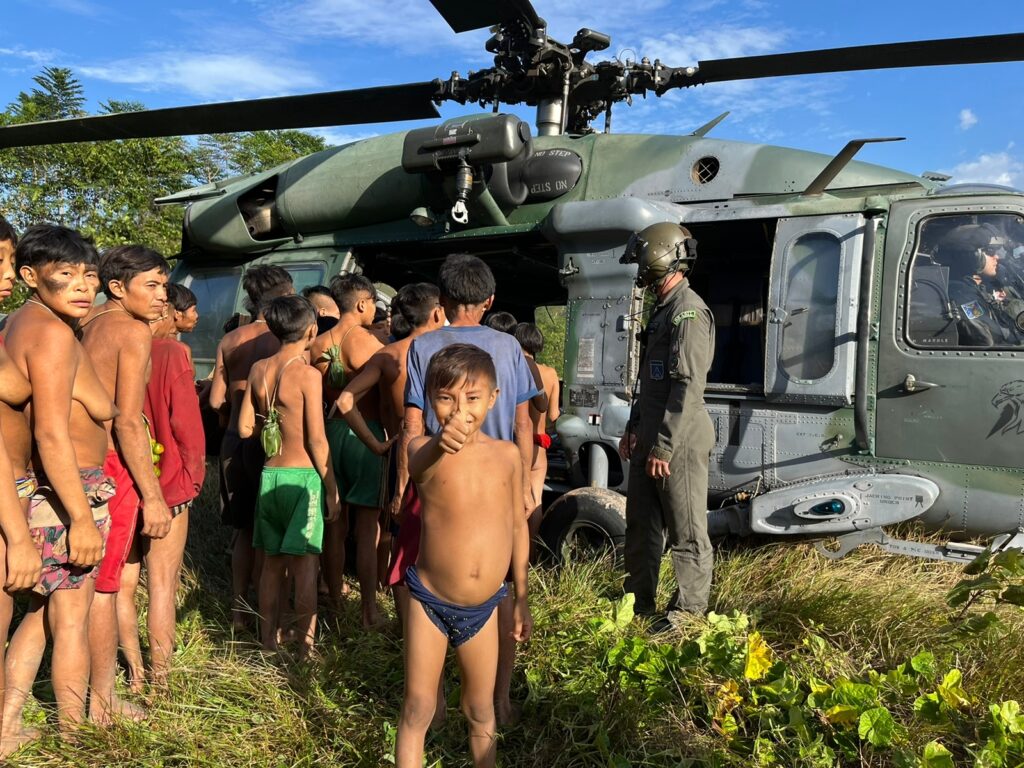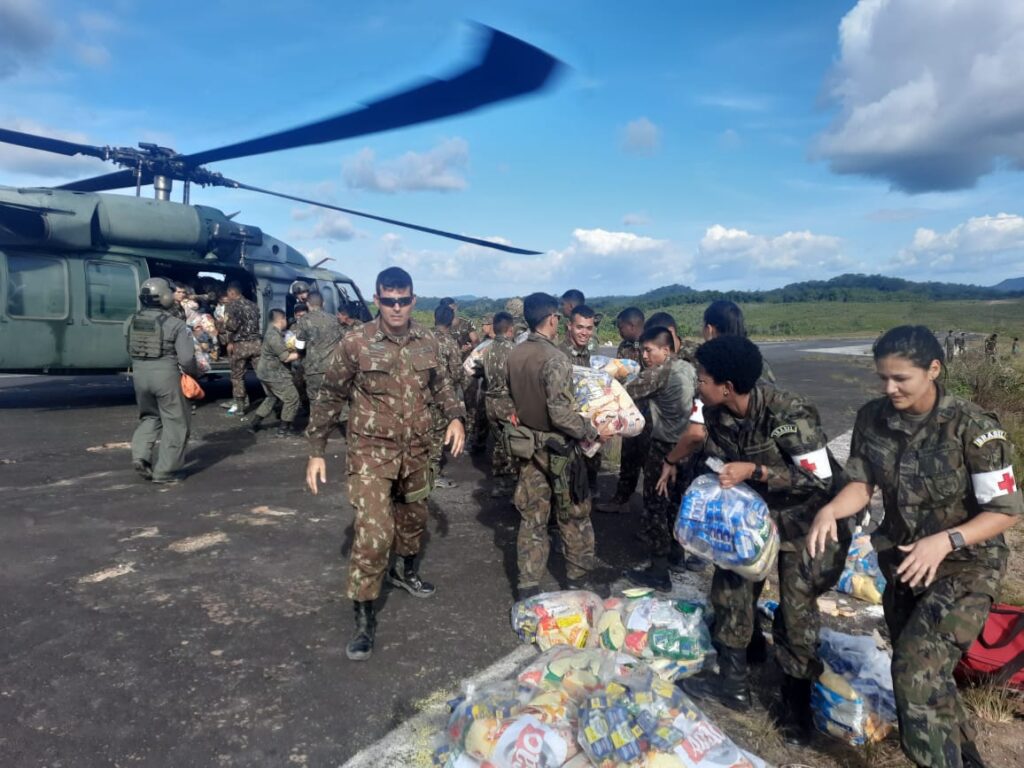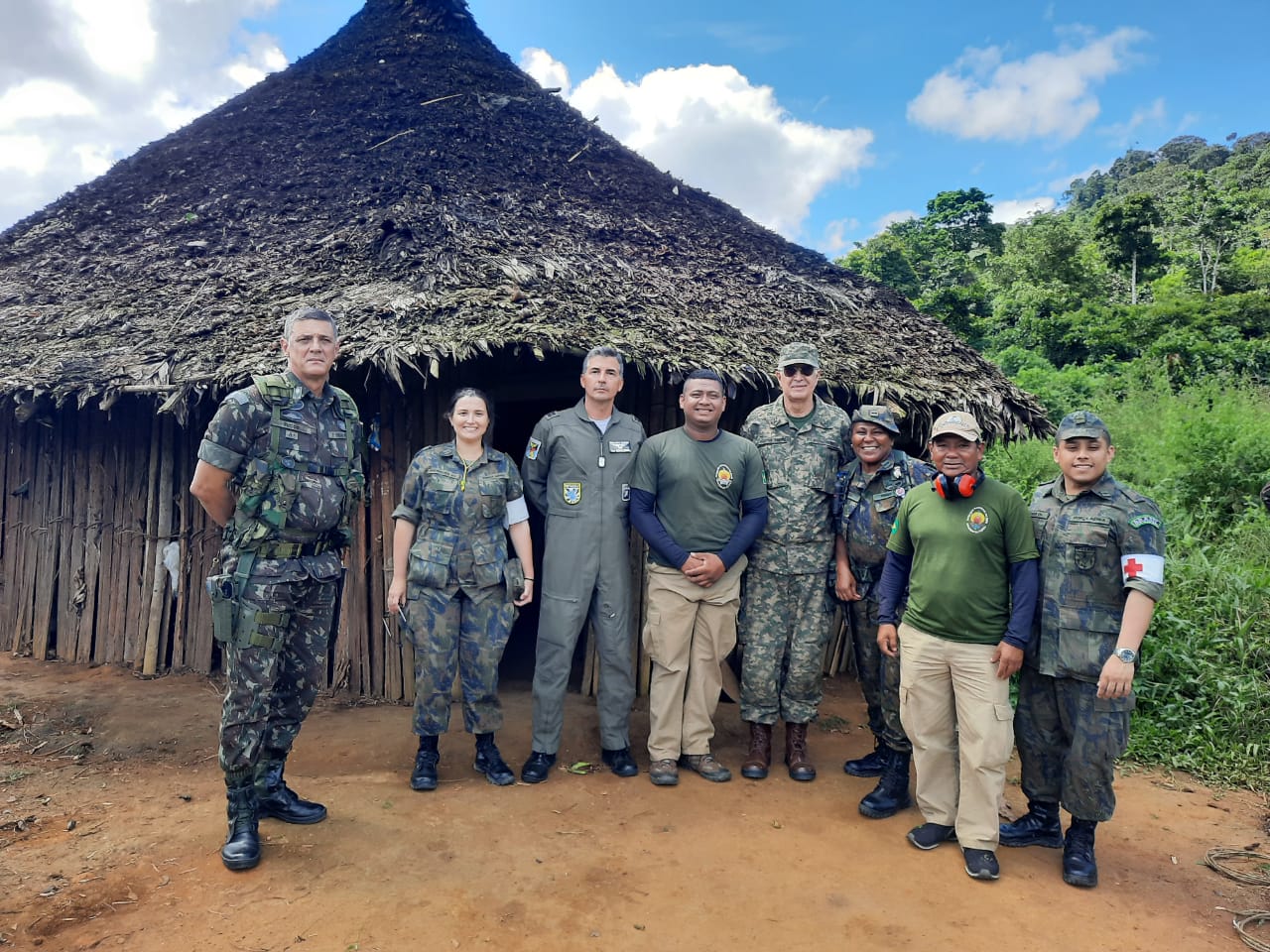Cargo and transport aircraft from the Brazilian Air Force are working daily to meet the needs of the indigenous community in Roraima
Air Force Agency
With the humanitarian crisis in the Yanomami territory, a task force was set up to adopt a series of aid measures that will be carried out immediately and will ease the situation of the indigenous people. The joint action has the support of the Brazilian Air Force (FAB), the Brazilian Army, the Ministries of Health, Justice and Public Safety, Development and Social Assistance, Family and Fight Against Hunger, and Management and Innovation in Public Services, the National Foundation of Indigenous Peoples (Funai), the Brazilian Institute of Environment and Renewable Natural Resources (Ibama), among others.
Among the actions are the shipment of food baskets and food supplements for children of various ages, as well as health care measures. To bring supplies to the region, the FAB, under the coordination of the Ministry of Defense (MD), acts with the daily transport of cargo and aeromedical evacuation.
The C-105 Amazonas aircraft, operated by the 1st Squadron of the 15th Aviation Group (1°/15° GAV – Jaguar Squadron), carried out, in an unprecedented manner, the multiple launching of two tons of medicines and basic medical products, such as serum, gases, syringes, and others. The KC-390 Millennium Aircraft, operated by the First Transport Group Squadron (1º/1º GT – Gordo Squadron), launched food baskets in the Surucucu region, located in Roraima (RR). Together, the two aircraft have delivered 37 thousand kilos of food supplies to the indigenous community.
FAB and Brazilian Army (EB) helicopters carry out, on a daily basis, the transportation of the baskets to the several indigenous communities affected by the health crisis in the region.
The H-60 Black Hawk helicopter transported two military pump operators and eight health professionals to help in Surucucu. In addition, 400 kilos of medical supplies were transported to the region. The H-60 also carried out the internalization of basic food supplies to the nearby regions, starting from Surucucu. At the moment, medical attention is being given to the indigenous people in the area. The most seriously ill patients are being evacuated, with the support of military aircraft, to hospitals in Boa Vista.

Integration
In addition to the FAB and EB, other agencies are involved in the mission. Funai, for example, coordinates the distribution of food baskets in the region for families in need of food and nutritional assistance, and also supports access to the Food Acquisition Program (PAA) and distributes tools. It also sent 200 cans of food supplements for children of various ages, which will be transferred from the Special Indigenous Health District East (DSEI East) to the DSEI Yanomami.
The whole operation requires a joint logistical effort by all the agencies involved. Since the airport in Surucucu is under construction, the transport of food is being done in small aircrafts, requiring about 50 flights at this stage. The aircraft transport food to the region and the distribution is done with the support of helicopters from FAB and the Army.
“Interoperability is essential not only among the Armed Forces, but also with the various agencies in our country. During this Yanomami humanitarian aid Operation, we have the possibility of putting into practice our operational capabilities in favor of the most needy,” stated the Commander of the Operational Group of the Boa Vista Air Base, Lieutenant Colonel Marcelo Muller Pons.
The Special Border Platoon (PEF), based in Surucucu, is responsible for housing the health teams and all the professionals sent to the mission.
The Ministry of Health has installed the Center for Emergency Operations in Public Health (COE – Yanomami) as the national mechanism for coordinated management of the response in this field. The management of the COE is under the responsibility of the Indigenous Health Department (Sesai/MS), acting according to the typology of the emergency.
The Ministry of Health teams are in the Yanomami region, an indigenous territory with more than 30.4 thousand inhabitants. The manager estimates that more than a thousand indigenous people have been rescued in recent days in serious health situation and made a point of emphasizing that the work is not done only by the Secretariat, but by interministerial actions.
A group with 13 professionals from the National Force of the Unified Health System (SUS) started the activities in the Army’s Field Hospital, to treat children and elderly people in serious health conditions, with malnutrition, besides cases of malaria, acute respiratory infection (ARI) and other diseases.
Another Air Force multidisciplinary team, with eight health professionals, went from Manaus to the Surucucu region (about 270 km west of the capital of Roraima). The FAB Field Hospital was inaugurated this Friday (27/01).

Text: Aspirant Vieira, Aspirant Gabrielle Varela and Aspirant Mônica Lopes / CECOMSAER -Photos: Sergeants Lucas and Neris / CECOMSAER
*** Translated by the DEFCONPress FYI Team ***
